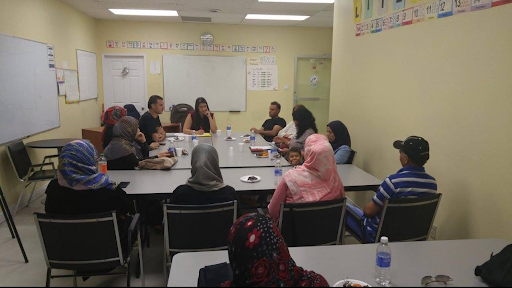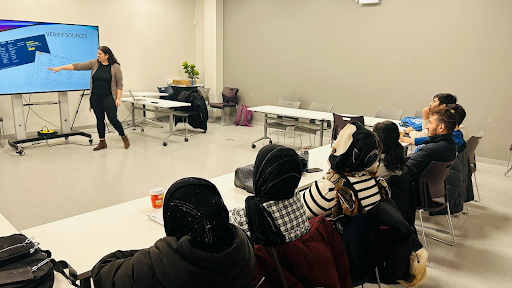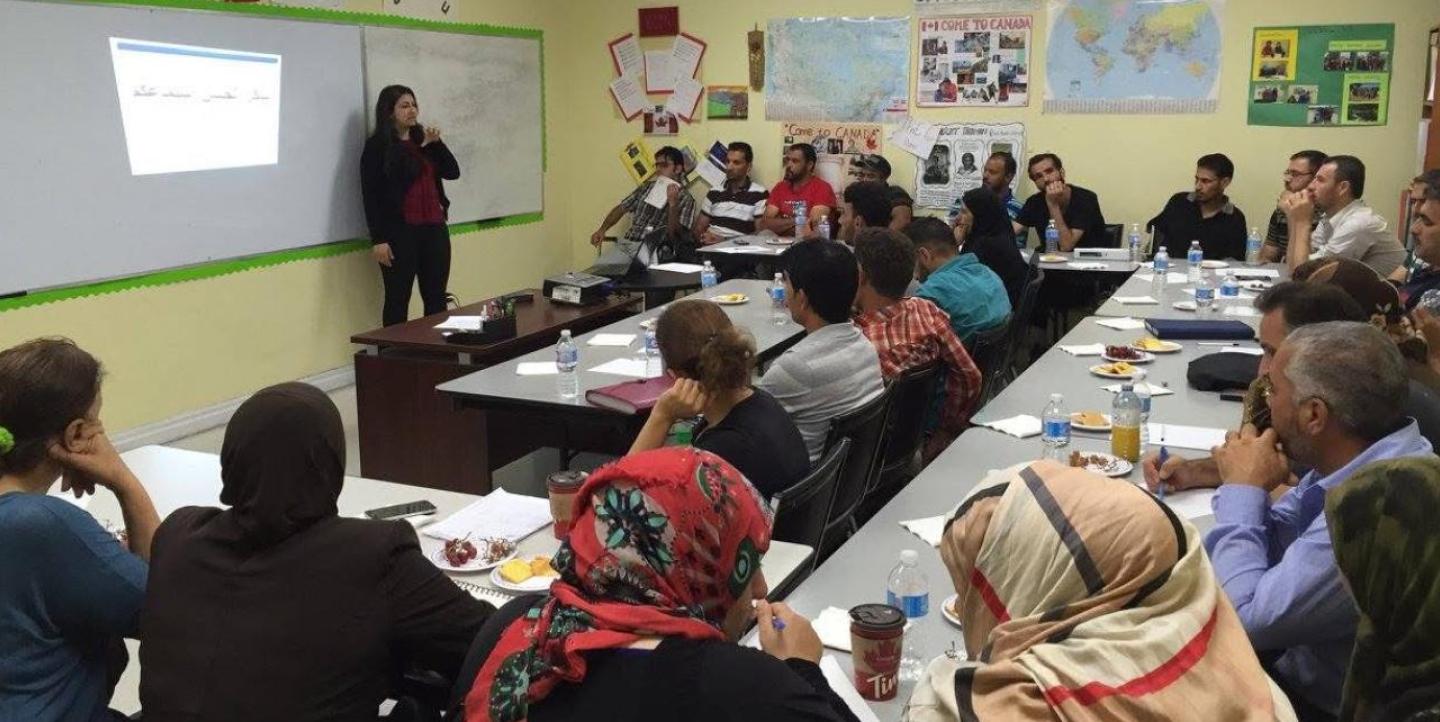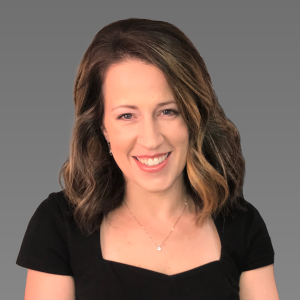The International Center for Journalists’ (ICFJ) Disarming Disinformation initiative is a three-year program, supported by the Scripps Howard Foundation, that aims to slow the spread of disinformation through multiple programs such as investigative journalism, capacity building and media literacy education. ICFJ partnered with MediaWise from the Poynter Institute to develop and deliver media literacy programming.
The media literacy training of trainers program accepted global participants for two different cohorts. The participants are community leaders who will educate others on the importance of media literacy and how to apply those skills in real life. The article below is one of five impact stories selected from the second cohort. The program thus far has trained 27 trainers who have reached more than 3,200 people.
As an immigrant, Mona Awwad knows how daunting it is to start over in a new country. The promise of a better future collides with the fear of acceptance. That vulnerability stays with Awwad to this day and sparked her curiosity when she saw the chance to become a media literacy trainer.
Awwad’s journey spanned most of her childhood. Born in Kuwait to a Jordanian family of Palestinian origins, she fled the Gulf War at five and returned with her family to Jordan. Later, she moved to the U.S., only to feel unwelcome after the Sept. 11, 2001 attacks. Back in Jordan again, Awwad felt torn between cultures and countries that she had called home — “too American” for Jordan, yet “too Jordanian” for America. In 2015, she arrived in Canada, where she finally felt at home.
Now a freelance print and broadcast journalist, Awwad draws on those experiences in her work with journalists and immigration policy researchers in the Middle East and North Africa. She also sees how media literacy can equip immigrants with skills that last a lifetime.
Why now, why media literacy?
Awwad’s experiences and awareness of the vulnerabilities immigrants face led her on this media literacy journey. She realised she can do more than support her fellow immigrant community at the moment, instead empowering her community with skills that last a lifetime.
“I witnessed firsthand how newcomers can be vulnerable to disinformation, especially when it affects critical areas like health, employment, or housing," said Awwad. "I wanted to give my community the tools to manage this reality, and to make sure that those who often have the least access to media literacy training are not left behind.”
Awwad, a journalist and researcher, had not received formal media literacy training until the International Center for Journalists’ Disarming Disinformation program, which featured MediaWise’s media literacy workshops. As she dug deeper into media literacy and its lasting implications, Awwad’s hunger for knowledge grew. She learned that the core of media literacy is about cultivating resilience and confidence. She also knew these two skill sets were crucial to her immigrant community’s ability to thrive in a new country.
“The program reshaped how I see media literacy. It’s not only about spotting false information or knowing how to verify sources. It’s a broader mindset. A daily habit of questioning, checking, and reflecting on the information we consume," she said.

The workshops
As an active member of existing settlement and newcomer support groups in Canada, Awwad knew she could tap into her existing network to run media literacy workshops for immigrants — employing both her Arabic and English language skills. Awwad reached nearly 80 individuals who recently moved to Canada with media literacy skills.
She approached her teaching through a framework she developed to help attendees easily remember the steps: QIRAA. QIRAA stands for "Question, Identify, Research, Acknowledge and Act," but more importantly QIRAA means “reading” in Arabic. Through this blend of Arabic and English — leaning on familiarity combined with the new — Awwad drew on her experiences to find a way to make media literacy skills relevant, relatable and easily remembered.
Through the QIRAA framework, Awwad guided workshop attendees through critical examination of information, credibility evaluation, challenging biases and recognising manipulation efforts. Participants shared their experience with misinformation and disinformation, but most importantly of all Awwad learned that many were still in need of digital literacy skills.
What’s the difference between digital literacy and media literacy?
As defined by UNESCO, “Digital literacy involves the confident and critical use of a full range of digital technologies for information, communication and basic problem-solving in all aspects of life.” Media literacy is defined by the National Association of Media Literacy as “the ability to access, analyse, evaluate, create, and act using all forms of communication.”
The core difference being, how to use technology versus the ability to discern information.
Impact
Awwad recognised that at first, the participants felt overwhelmed. They were unaware of how often disinformation shows up in their daily lives, both on and off digital devices. This realisation left a feeling of hopelessness and despair, but through Awwad’s nurturing approach she practised techniques with the attendees so they left the workshop feeling empowered to navigate the real world and spot disinformation on their own.
These techniques focused on the ability to identify scams, especially false ads and rental fraud. Awwad walked the attendees step by step through the real time process of verifying a rental ad that ultimately was false. Others found themselves victims of false news sites, also called pink slime sites, which lead the viewer to believe they are legitimate news sites when in fact they aren't.
Following the practical exercises Awwad introduced to her workshop attendees, participants shared that they felt more confident and had already employed the techniques to protect both themselves and their families from scams.
Attendees of Awwad’s workshops have since shared positive outcomes thanks to her time and devotion, ensuring they are well equipped to navigate their information ecosystem. One participant said that after the session, she helped her elderly father avoid being scammed by a false rental ad having used the verification tips learned in the training to check the source. Another attendee chose to use their new knowledge by empowering others, volunteering at a local community center to explain misinformation and disinformation.

What’s next?
More media literacy workshops! Following Awwad’s original workshop series, she will continue her work as a media literacy trainer, with some tailored sessions focussing on employment, housing and health-related disinformation. She also plans to hold workshops specifically on digital literacy as a foundation before teaching basic media literacy skills and then advanced verification techniques. The tiered approach is meant to reinforce each step, helping participants make lasting changes in how they spot and resist false information.
For Awwad, the mission is clear: “I know how vulnerable newcomers can be to confusion, misinformation, and even scams when trying to settle. Helping them navigate information with more confidence feels deeply personal to me. It’s my way of giving back in the same way I once needed support.”
Main image courtesy of Mohammad Abdulhaleem.
Renata Salvini contributed to this article.


